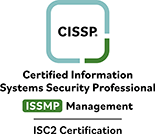Unable to find what you're searching for?
We're here to help you find itISSMP Course Overview
The CISSP-ISSMP (Information Systems Security Management Professional) course is an advanced certification for experienced information security professionals, specifically focusing on the management aspects of information security. It is designed to provide learners with the skills and knowledge needed to lead, design, and oversee an organization's information security program.
The course covers a wide range of topics, including leadership and business management, emphasizing the integration of information security into the company's culture and governance. Lessons on information security strategies, Data classification, and Security policy framework prepare learners to address complex security challenges within their organizations.
Through Systems lifecycle management, the training ensures that participants understand how to incorporate security into the System Development Lifecycle (SDLC) and manage the associated risks. The course also delves into Compliance and contingency management, teaching how to develop effective contingency plans and understand the legal and ethical implications of information security.
By completing CISSP-ISSMP training, learners will be equipped with the tools to develop robust security policies, manage risk effectively, and ensure their organizations are compliant with relevant laws and regulations, making them valuable assets in the field of information security management.
Purchase This Course
USD
View Fees Breakdown
| Course Fee | 2,990 |
|
Total Fees (with exam) |
2,990 (USD) |
USD
View Fees Breakdown
| Course Fee | 2,300 |
|
Total Fees (with exam) |
2,300 (USD) |
USD
View Fees Breakdown
| Flexi Video | 16,449 |
| Official E-coursebook | |
| Exam Voucher (optional) | |
| Hands-On-Labs2 | 4,159 |
| + GST 18% | 4,259 |
|
Total Fees (without exam & Labs) |
22,359 (INR) |
|
Total Fees (with Labs) |
28,359 (INR) |
Scroll to view more course dates
You can request classroom training in any city on any date by Requesting More Information
♱ Excluding VAT/GST
*Inclusions in Koenig's Learning Stack may vary as per policies of OEMs
Suggestion submitted successfully.
Koenig Learning Stack
Inclusions in Koenig's Learning Stack may vary as per policies of OEMs

